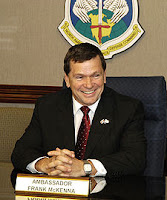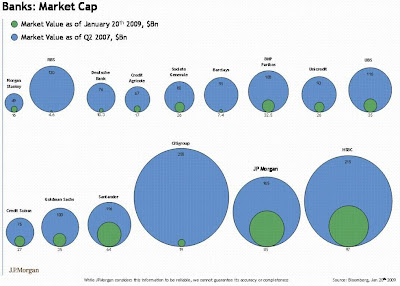Wealth Management
February 2, 2009
David Rubenstein at Davos
Will inflation hit private equity?
 This is a copy of an old 10 Billion Mark coupon.
This is a copy of an old 10 Billion Mark coupon.Ponder this extraordinary piece of paper (which is obviously no longer is in circulation). Use it as a reminder of the hyper-inflation of the 1920s in Germany. In those days, these sums were the cost of daily groceries.
Certain early childhood experiences stay with you forever and some of these can impact the way you look at money and finances. In my case, I've always been weary about the hidden loss of value from inflation due to my upbringing in Zambia and Zimbabwe. So, yes, the 1920s were very different times which hopefully never come back. But with the current economic climate, particularly in the epicenter of leverage and deficit spending i.e. US government and households, we should never loose sight of the danger of inflation.
Look no further than Zimbabwe where in 2008, a loaf of bread cost 1.6 trillion Zimbabwe Dollars. In short, various prices have come down and quite rightly so are now at much more realistic levels, but we should fear inflation much more than deflation.
Private equity has cash but is not coming into the market at valuations business owners want. This dance will continue for 2009.
Where Do I Get Money?
"CYBF is a terrific place for young entrepreneurs to begin their journey," says Jacoline Loewen, author of Money Magnet. "CYBF will take entrepreneurs through the steps to managing their money and also help out with a mentor."
Listen to more on the radio show Small Business, Big Ideas.
January 28, 2009
Now You're Talking, Stephen
Stephen Harper's Conservative government recognizes the value of CYBF.
“Canada has no shortage of young people ready and willing to defy the current doom and gloom. This grant from the Government of Canada will let us increase dramatically the number of business start-ups that we can finance and support through our partners in more than 150 communities across the country,” said Vivian Prokop, CEO of the national charity.
“I would like to thank in particular Industry Canada, Industry Minister Tony Clement, and Minister of State for Small Business and Tourism Diane Ablonczy for their enthusiasm in nurturing a culture of entrepreneurship at a time when Canada needs it most.”
While access to business credit is tight and unemployment is rising, the demand for the CYBF’s financing and mentoring services continues to grow. The number of CYBF-funded start-ups from October 2008 through January 2009 was 68 percent higher than during the same period in 2007, and the Government of Canada’s investment will enable CYBF to meet this growing demand and accelerate its pace of lending.
An estimated 20,000 young people want to start businesses every year but find it difficult to obtain financing through traditional sources. CYBF offers an experienced volunteer mentor and a loan of up to $15,000 with no collateral. Qualified applicants can access a further $15,000 through a partnership with the Business Development Bank of Canada.
The one-year grant will provide much-needed stimulus in communities from coast to coast, enabling the launch of an estimated 800 new businesses within 5 years. Based on the performance of CYBF clients to date, these businesses will generate an estimated 5,000 new jobs, $135 million in sales revenue and $32 million in tax revenue within 5 years
Snapshot of Canada's 2009 Budget
Thanks to Scott Tomenson, Wealth Management Consultant, for providing us with this link. Read.
Visit Scott at http://familywealthmanager.blogspot.com/
January 26, 2009
Business owners need private equity
 Entrepreneurs and business owners would like Frank McKenna - the fellow who was put forward to head the Liberal Party, but who sadly declined.
Entrepreneurs and business owners would like Frank McKenna - the fellow who was put forward to head the Liberal Party, but who sadly declined.I was at my Secret Handshake Bay Street Club - The Ticker Club - where Frank McKenna was the guest speaker and he blew the roof off with his dynamism. Coming from New Brunswick, Frank is prgamatic and gets the role of the manufacturing and other technology businesses in building a strong Canada.
He said, "We need to expand our thinking around innovation from just pumping oil to other countries. We need to be the best at the supporting manufacturing, equipment, technology and service busineses around oil. The same goes for forestry."
"Sounds great but the reality is tough. Many of those types of companies suggested by McKenna are potential clients for Loewen & Partners' services - raising capital for owner managed companies," says Jacoline Loewen, author of Money Magnet. "The problem is that these companies do need to get to be over $100M to survive in the global market. It is very difficult for these companies to do this on their own. Yet, many of these owners do not understand or trust private equity, their ideal partner to grow their companies."
http://www.moneymagnetbook.ca
$1 Trillion and Counting...
 Astoundingly, and possibly incomprehensible to most, London based Private Equity Intelligence reported this month that Private Equity Funds raised the second highest level of annual funding in 2008. Approximately $1 Trillion of capital is currently ready to be deployed. Only a quarter of this was raised by large buy-out funds, though this amounts to $284.2 billion last year, about the size of Ireland's GDP. The rest was raised by funds with other focuses, such as real estate funds ($153.5 billion) and funds focused on SMEs, 217 funds raised money in this category, the most of any other.
Astoundingly, and possibly incomprehensible to most, London based Private Equity Intelligence reported this month that Private Equity Funds raised the second highest level of annual funding in 2008. Approximately $1 Trillion of capital is currently ready to be deployed. Only a quarter of this was raised by large buy-out funds, though this amounts to $284.2 billion last year, about the size of Ireland's GDP. The rest was raised by funds with other focuses, such as real estate funds ($153.5 billion) and funds focused on SMEs, 217 funds raised money in this category, the most of any other. However, this news may seem counterintuitive to the news released today, that 50,000 jobs were lost in the U.S. in one day. Coping with the shock is likely on the mind of all of 50,000 newly minted unemployed. However, to fund managers with bulging war chests, the wait is on to discover the bottom. With asset prices falling, demand slumping, and credit inaccessible for most, fund managers are in a very comfortable position to deploy the tremendous amount of cash at their disposal at the plethora of deals not finding an investor right now. The difficult part is finding the bottom.
A report in the Globe and Mail today suggests that the worst of the economic turmoil may now have passed. The argument made by Allan Robinson is that Treasury yields have stabilized and have actually shown preliminary signs of rising (judge for yourself the significance of the the rise, but the decline seems to have stabilized...for now). This means that investors are looking to move their money from out of the wing of the Treasuries and into, likely, investment grade corporate bonds. This is significant because it means investors are beginning to trust the relative stability we are seeing right now.

Jack Welch blames the i-bankers

Private equity will be coming into its own for exactly the reason Jack says - these are mostly privately held funds. The best funds will be those that risk the fund partners' money, not just yours. Otherwise, you can put your money back into the public market, but maybe you should head for Las Vegas instead.
Lending to Friends
 Banks are not lending and owners of companies suffer.
Banks are not lending and owners of companies suffer.January 20, 2009
Bum Rap for Gen Y
Many Baby Boomers will say, “Those kids need to learn it’s tough and you don’t get a trophy just for turning up for work. No one’s there to applaud and video their every step.”
What about my generation – the Baby Boomers – will our work needs change? Millennial might say, “They destroyed the environment, let greed override ethics and are maxing out the credit, leaving Millennials to pay the tab.”
With four generations working together, we need to get beyond this tired cycle of thinking your own generation is the best and you have to fix the others because they don’t have clue. How can we understand each generation in order to blend the best of our talents?
I put this question to a Millennial engineer, Michael Keenan, whose employer, Arcelormittal Dofasco Steel, is actively addressing the generational gap. “We look at the pivotal events during the formative years of each generation,” says Michael. “Once you understand each generation’s shared geography, cultural and economic environment and the impact on their needs, it is much easier to work together because you understand why they are different.”
Dofasco is using Maslow’s hierarchy of needs to frame each generation’s work behaviour. Each level of needs must be fully satisfied before you can move up to the next level. First level of needs are the physical - which means having a full stomach, for example, or being comfortable. The next stage is the need for safety – to have a job, a home, a family and shared morality with your neighbours. For Canadian-raised Millenials, the luxury of growing up in the most peaceful and affluent time in Canada means that they can move past the safety level right up to esteem needs for recognition for their work and self motivation. They can even reach self actualization which is the need for self governance and the bigger issues of society like justice or peace. Since up until the economic melt down, Millennial have not been afraid for their jobs, they have enjoyed the space to explore these higher level needs.
Hollywood movies help us to put ourselves in those first twenty years of other generations and the early life experiences which shaped the rest of their lives. When supporting actors from the World War II movie Defiance talked about how miserable it got while filming in the forests of Lithuania, you know this is Generation X and The Millennial speaking about their work. It would be tough to imagine John Wayne complaining about the hardships of his movie location. Yet, on the other hand, these young actors are far more nuanced about the deep meaning of their movie and able to probe and question.
Now imagine if you were in that forest and hungry too, with real soldiers with real guns hunting for you. Even snuggled up next to Daniel Craig, smoothing back your hair and letting you check out his bikini briefs – you may find your needs are not so much about having a house with a white marble kitchen or a job that follows your dreams or even the rules of the Geneva Convention. You are at the bottom of Maslow’s hierarchy and after such a trauma, you would be grateful for any darn house, a solid job and you would faithfully work for the boss without question.
Baby Boomer journalist, Tom Brockaw, called people raised during the war “The Greatest Generation” which may sound like overblown hyperbole to Generation Xers and Millennials as they look at Grandfather slumped in his armchair. But WW II is within the memory of humans living today and I meet many of them still working, running poultry, transportation, construction companies, as well as law and finance firms.
In extraordinary contrast, Canadian born Millennial had no war, no fear for their lives, for their family, for their neighbours turning on them or their country being taken by force. Since parents may be funding their lives, they have the luxury of moving way up Maslow’s hierarchy of needs past the Baby Boomers’ level of social needs, to the esteem set of needs and for some, even to self actualization. It is not a surprise then that Millennial in the workplace have smaller social distance between others and have little fear of authority or of others. It is a great place to be.
Companies can benefit if they understand this level of needs. Boomers, once they get this, tap into Millennia’s energy which is team-based and seeking to be the best.
The Millennials I meet are in the finance industry and are exciting because they do question, can hold a range of views not just black and white, pick up work to do on their own initiative and for their own career development. This Canadian generation thinks globally, questions social issues, are challenging, want a balanced life but are there when the work needs to get done by midnight. I may have a slanted view but I think calling Millenials Most Entitled Generation gives them a bum rap.
In sum, it certainly helps me to understand work behaviour by using Maslow’s hierarchy of needs and to see how each generation’s context was completely different. It helps explain a great deal. I know I will be able to work together with more purpose. What do you think?
[1] http://www.abraham-maslow.com/m_motivation/Hierarchy_of_Needs.asp
[2] http://www.amazon.com/Greatest-Generation-Tom-Brokaw/dp/0375502025
